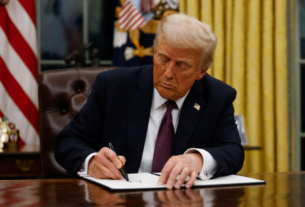In 2025, President Donald Trump’s decision to withdraw the United States from the Paris Agreement has set off a ripple in global climate negotiations, with countries like Indonesia rethinking their funding strategies for climate initiatives. Indonesia, one of the world’s largest emitters of greenhouse gases, has been actively involved in the Paris Agreement.
Before the U.S. exit, Indonesia benefited from financial support through the Just Energy Transition Partnership (JETP), a U.S.-led initiative to help developing countries transition to clean energy. The JETP had pledged significant funding to support Indonesia’s energy transition, allowing the nation to diversify its energy sources and reduce its dependence on coal, one of the most important contributors to its carbon emissions.
With the U.S. pulling out of the Paris Agreement, Indonesia faces uncertainty about the continuity of these critical financial resources. The loss of U.S. support leaves a gap in the funding Indonesia had counted on to meet its renewable energy targets, which are integral to its long-term climate strategy. As a result, Indonesian leaders are now evaluating alternative sources of climate finance to ensure that their ambitious climate goals are not derailed.
To address the funding gap, Indonesian officials have begun considering China as a potential partner for climate financing. China, already a significant global player in renewable energy technology and investment, has expressed interest in supporting Indonesia’s energy transition projects. This shift could lead to stronger cooperation between the two countries, particularly in solar and wind energy, where China has made notable advancements.
China’s interest in supporting Indonesia’s energy transition could open up new opportunities for developing large-scale renewable energy projects. However, Indonesian leaders are mindful of the geopolitical implications of deepening ties with China, especially considering China’s complex relationships with other global powers, including the United States.
The growing interest in China as a potential source of climate financing reflects broader trends in global climate diplomacy. Many developing countries are turning to China for financial support in addressing climate change, particularly as the U.S. has become less predictable in its commitment to international climate agreements. This shift presents opportunities and challenges for Indonesia as the country must navigate the potential benefits and risks of closer ties with China.
Indonesia’s commitment to the Paris Agreement remains firm, and the government has expressed its determination to continue progressing on its climate goals. Even in the face of a reduction in U.S. funding, Indonesia is exploring new partnerships with countries willing to invest in its renewable energy infrastructure. While China presents an attractive option, Indonesia is also reaching out to other nations and organizations that may offer alternative sources of climate finance.
One of the key issues Indonesia will need to address as it seeks new climate funding sources is ensuring that any partnerships it forms align with its national interests. Indonesia has carefully balanced economic growth with environmental sustainability, and any new financial partnerships must respect this balance. As the country diversifies its sources of climate finance, it will need to ensure that these partnerships do not come with strings attached that could limit its policy options in the future.
Over the coming years, Indonesia’s shift towards China for climate funding could lead to a closer economic and political relationship between the two countries. However, this move may also affect Indonesia’s relationship with the U.S. and other Western nations, mainly if it increases Chinese influence in Indonesia’s energy sector. As Indonesia explores new avenues for climate finance, it must carefully consider the broader geopolitical dynamics.
Ultimately, Trump’s exit from the Paris Agreement has forced Indonesia to reassess its approach to climate financing. While the loss of U.S. support is a setback, it has opened new opportunities for collaboration with other countries, including China, to help Indonesia achieve its climate goals. The shift could have long-term implications for Indonesia’s energy sector and broader foreign policy and economic relationships.




